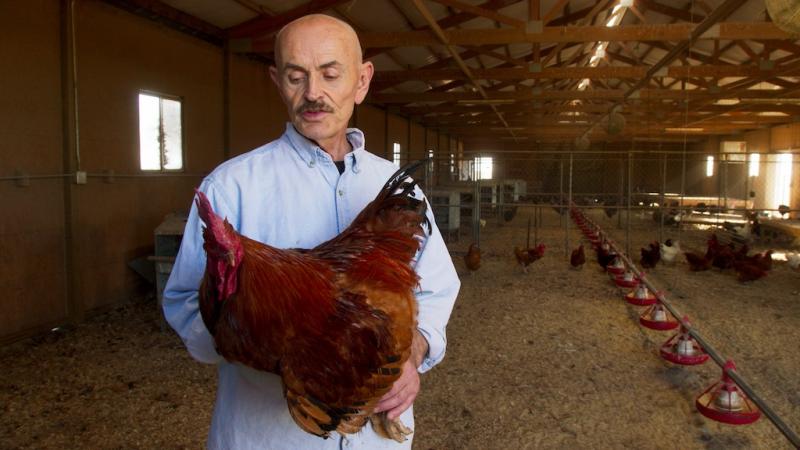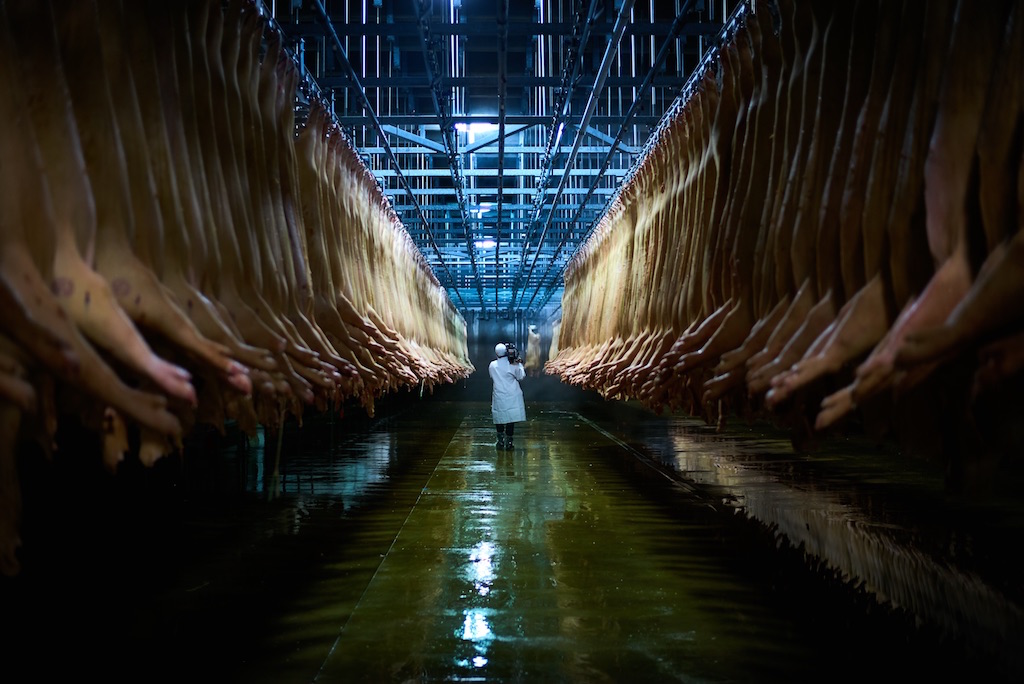Eating Animals review - a compelling tale of imminent disaster | reviews, news & interviews
Eating Animals review - a compelling tale of imminent disaster
Eating Animals review - a compelling tale of imminent disaster
The nastiness of the meat industry laid bare

Eating Animals begins as a David and Goliath tale of independent farmers versus industrial farming. Frank Reese specialises in rare-breed turkeys and chickens. He calls his farm the "Good Shepherd Poultry Ranch" because, for him, his traditional way of farming is akin to a religious experience.
Paul Willis has a similarly passionate commitment to the pigs roaming freely on his ranch; his pork is delicious, but while he sends 3,000 pigs a week for slaughter, a factory farm can produce 4,000 a day, so it's not surprising that 99 % of meat produced in the United States comes from factory farms.
Cut from open fields to vast warehouses divided into metal pens so small that the imprisoned pigs can scarcely move. Christopher Quinn’s film is far more than a trip down memory lane, though. Based on the book by Jonathan Safran Foer, it reveals, little by little, the impact of factory farming on the environment. The waste from all those pigs drains into open lagoons; in North Carolina there are 2,500 of these cess pools whose contents seep into the ground water polluting rivers, killing fish and damaging the ecosystem. For 20 years Riverwatch has been trying to persuade the authorities to take action against the lagoons, but to no avail. The interests of big business are given priority over environmental issues.
The Department of Agriculture also protects the food industry from whistle blowers. We met Jim Keen, professor of Veterinary Epidemiology, who exposed the cruel experiments conducted at the United States Meat Animal Research Center on the pretext of improving animal welfare and, for his pains, was targeted by the FBI as an eco-terrorist. We followed the fortunes of Craig Watts, a chicken farmer contracted to Tyson Foods who, he says, treats him like a surf. Wandering through a huge barn crammed with chickens, he picks out deformed and dying birds, victims of genetic engineering designed to make them fatten faster. Sickened by the practice, he began to document the defects; his film was put on Youtube and went viral, but nothing was done except that he was blamed for the deformities. To silence all criticism, Ag-Gag legislation has now been introduced in 30 states, making it a crime to film or photograph on or even near factory farms. So this documentary was made just in time. And before you start thinking, “Well that’s the US for you; in Britain we have higher standards”, ask yourself if you really know what goes on behind the closed doors of our battery farms or the "Keep Out" signs of our indoor pig units. Even if our farmers were more humane, it doesn’t alter the fact that nearly 40 % of climate change is caused by animal farming.
To silence all criticism, Ag-Gag legislation has now been introduced in 30 states, making it a crime to film or photograph on or even near factory farms. So this documentary was made just in time. And before you start thinking, “Well that’s the US for you; in Britain we have higher standards”, ask yourself if you really know what goes on behind the closed doors of our battery farms or the "Keep Out" signs of our indoor pig units. Even if our farmers were more humane, it doesn’t alter the fact that nearly 40 % of climate change is caused by animal farming.
Information like this is bound to be unwelcome, so how to keep people in their seats long enough to get the message across? The rest of the film is structured as a narrative about the brave souls who risk everything to warn us that things must change and, drawn in by their stories, you find yourself absorbing some mind-boggling facts. An astounding 80 % of the antibiotics produced by pharmaceutical companies goes into animal feed, so the milk we drink and the meat we eat are full of antibiotics whose ubiquity accelerates the development of drug-resistant superbugs. As a result, Bob Martin from the Center for a Livable Future, foresees a pandemic breaking out comparable to the Spanish flu which, in 1918, killed 25 million people in 25 weeks. Its a matter of when, not if, he argues.
Feeling queasy? Then ponder this. “To produce enough chickens to feed the world population,” says Dr Pete Kaiser, Chair in Animal Infectious Diseases at the Roslin Institute, “we’re gonna have to double our output from 50 to 100 billion a year, unless we all turn vegetarian tomorrow.” And there you have it, a ready made answer; but if giving up meat altogether feels like a step too far, watch Eating Animals for further suggestions. It could be the most important film you see all year.
rating
Explore topics
Share this article
The future of Arts Journalism
You can stop theartsdesk.com closing!
We urgently need financing to survive. Our fundraising drive has thus far raised £49,000 but we need to reach £100,000 or we will be forced to close. Please contribute here: https://gofund.me/c3f6033d
And if you can forward this information to anyone who might assist, we’d be grateful.

Subscribe to theartsdesk.com
Thank you for continuing to read our work on theartsdesk.com. For unlimited access to every article in its entirety, including our archive of more than 15,000 pieces, we're asking for £5 per month or £40 per year. We feel it's a very good deal, and hope you do too.
To take a subscription now simply click here.
And if you're looking for that extra gift for a friend or family member, why not treat them to a theartsdesk.com gift subscription?
more Film
 The Mastermind review - another slim but nourishing slice of Americana from Kelly Reichardt
Josh O'Connor is perfect casting as a cocky middle-class American adrift in the 1970s
The Mastermind review - another slim but nourishing slice of Americana from Kelly Reichardt
Josh O'Connor is perfect casting as a cocky middle-class American adrift in the 1970s
 The Perfect Neighbor, Netflix review - Florida found-footage documentary is a harrowing watch
Sundance winner chronicles a death that should have been prevented
The Perfect Neighbor, Netflix review - Florida found-footage documentary is a harrowing watch
Sundance winner chronicles a death that should have been prevented
 Blu-ray: Le Quai des Brumes
Love twinkles in the gloom of Marcel Carné’s fogbound French poetic realist classic
Blu-ray: Le Quai des Brumes
Love twinkles in the gloom of Marcel Carné’s fogbound French poetic realist classic
 Frankenstein review - the Prometheus of the charnel house
Guillermo del Toro is fitfully inspired, but often lost in long-held ambitions
Frankenstein review - the Prometheus of the charnel house
Guillermo del Toro is fitfully inspired, but often lost in long-held ambitions
 London Film Festival 2025 - a Korean masterclass in black comedy and a Camus classic effectively realised
New films from Park Chan-wook, Gianfranco Rosi, François Ozon, Ildikó Enyedi and more
London Film Festival 2025 - a Korean masterclass in black comedy and a Camus classic effectively realised
New films from Park Chan-wook, Gianfranco Rosi, François Ozon, Ildikó Enyedi and more
 After the Hunt review - muddled #MeToo provocation
Julia Roberts excels despite misfiring drama
After the Hunt review - muddled #MeToo provocation
Julia Roberts excels despite misfiring drama
 London Film Festival 2025 - Bradley Cooper channels John Bishop, the Boss goes to Nebraska, and a French pandemic
... not to mention Kristen Stewart's directing debut and a punchy prison drama
London Film Festival 2025 - Bradley Cooper channels John Bishop, the Boss goes to Nebraska, and a French pandemic
... not to mention Kristen Stewart's directing debut and a punchy prison drama
 Ballad of a Small Player review - Colin Farrell's all in as a gambler down on his luck
Conclave director Edward Berger swaps the Vatican for Asia's sin city
Ballad of a Small Player review - Colin Farrell's all in as a gambler down on his luck
Conclave director Edward Berger swaps the Vatican for Asia's sin city
 London Film Festival 2025 - from paranoia in Brazil and Iran, to light relief in New York and Tuscany
'Jay Kelly' disappoints, 'It Was Just an Accident' doesn't
London Film Festival 2025 - from paranoia in Brazil and Iran, to light relief in New York and Tuscany
'Jay Kelly' disappoints, 'It Was Just an Accident' doesn't
 Iron Ladies review - working-class heroines of the Miners' Strike
Documentary salutes the staunch women who fought Thatcher's pit closures
Iron Ladies review - working-class heroines of the Miners' Strike
Documentary salutes the staunch women who fought Thatcher's pit closures
 Blu-ray: The Man in the White Suit
Ealing Studios' prescient black comedy, as sharp as ever
Blu-ray: The Man in the White Suit
Ealing Studios' prescient black comedy, as sharp as ever
 The Woman in Cabin 10 review - Scandi noir meets Agatha Christie on a superyacht
Reason goes overboard on a seagoing mystery thriller
The Woman in Cabin 10 review - Scandi noir meets Agatha Christie on a superyacht
Reason goes overboard on a seagoing mystery thriller

Add comment